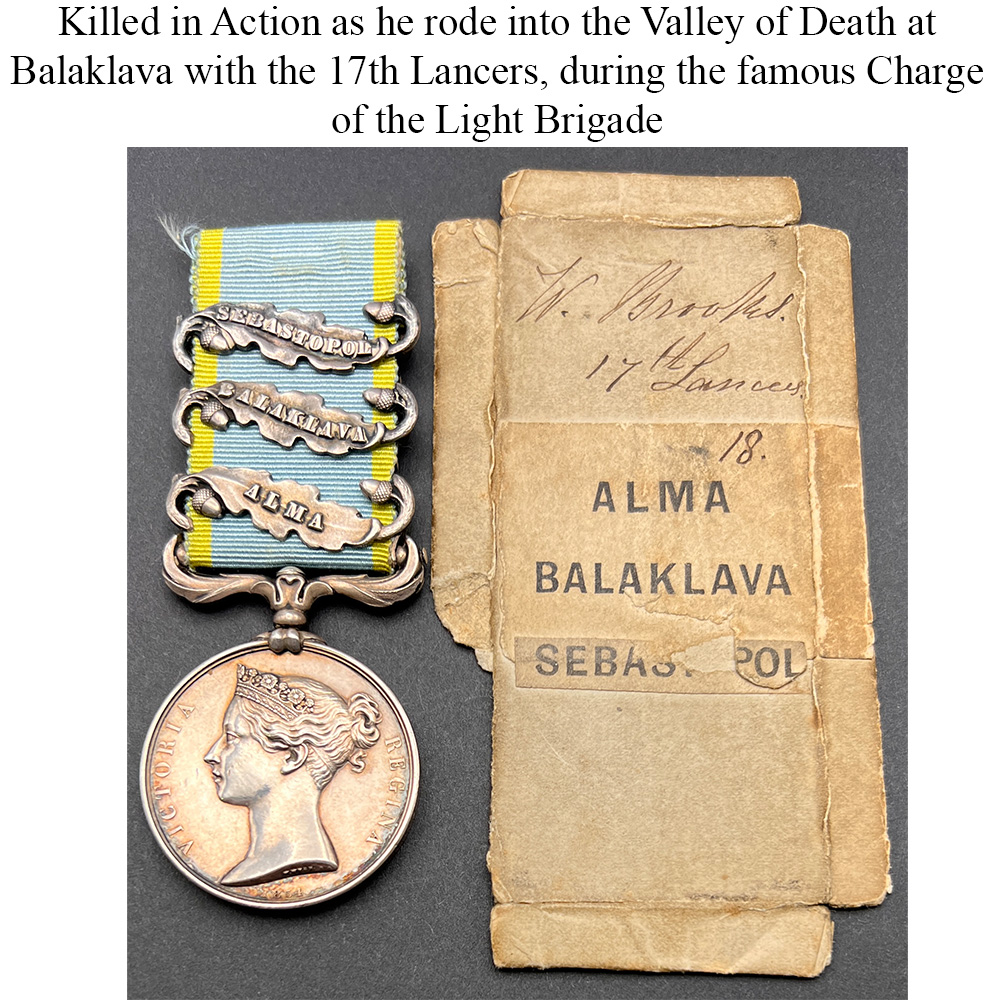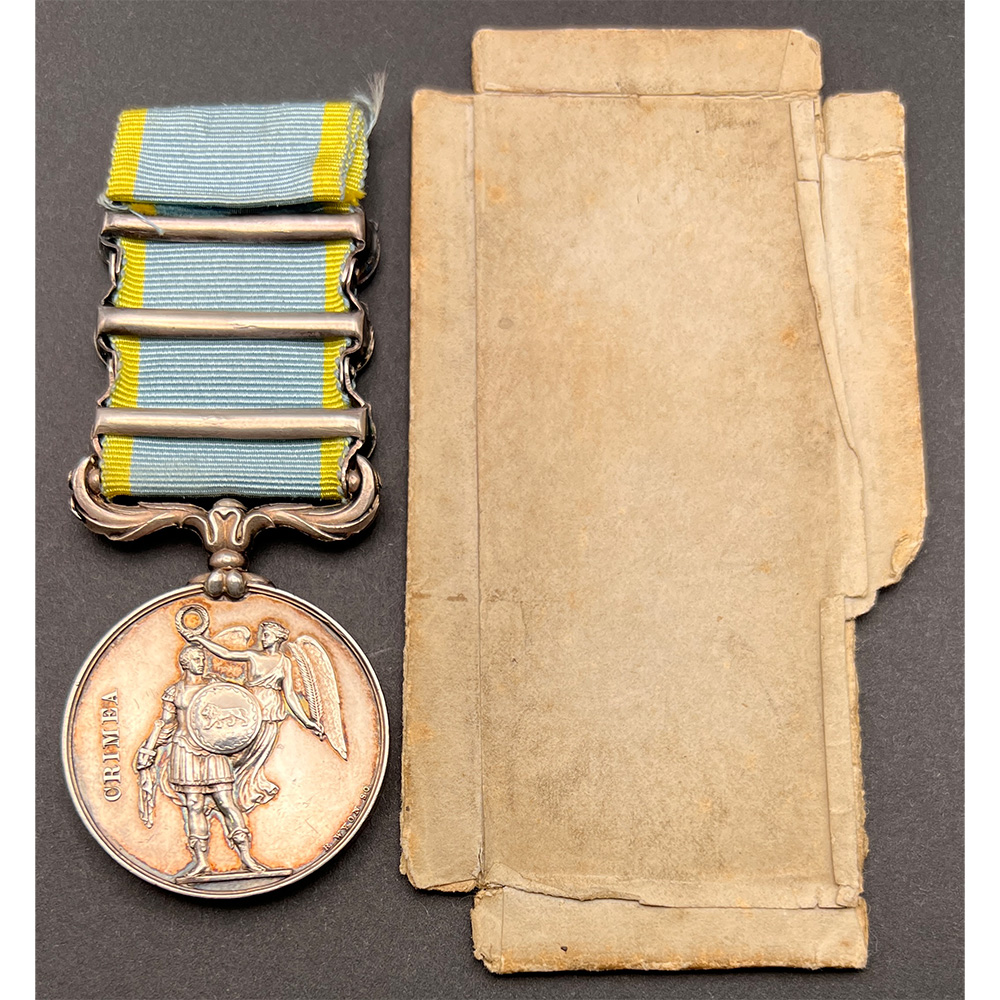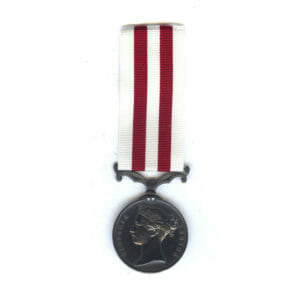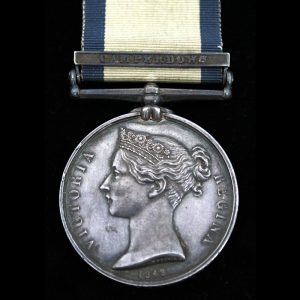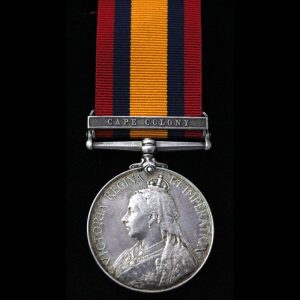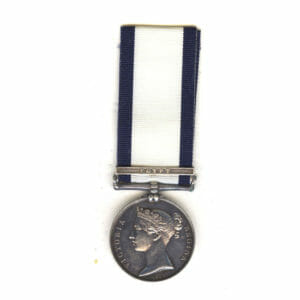Description
During the Charge of the Light Brigade, Walter Brooks was the Right Hand Man to Sergeant William Butler, 17th Lancers who writes after the battle:
“Captain Nolan had not gone 400 yards when he was shot, the first to fall in our Charge. Just was got to No 1 Redoubt, my Right-Hand Man Walter Brooks, was also shot. He was my comrade for over 3 years, from the time I went to 4th Troop.”
He adds right afterwards, his quest for vengeance against the Cossacks:
“We got a bit further, when my left-hand man fell. My blood was up, and I began to wish to get near the enemy.
Shot and shell were coming in all directions. What few reached the guns – and I amongst them, cut away like madmen and succeeded in taking and spiking them.”
Crimea Medal, 3 bars, Alma, Balaklava, Sebastopol, Private Walter Brooks, 17th Lancers. Officially Impressed Naming, Killed in Action during the Charge of the Light Brigade at Balaklava.
Officially impressed: “W. Brooks, 17th Lancers.”
Confirmed on the medal roll, and also a Confirmed Charger with the Light Brigade, on all 4 lists, Sergeant William Butler, further corroborates his presence and death in action, when he was shot and killed whilst charging at the enemy.
The medal roll notes “Killed in Action 25th Oct 54”, and “WO” as the medal was assembled and officially impressed for issue by the War Office.
Also included is the very rare surviving, hand-written box lid for the medal when it was issued.
An exceptional and moving medal.
Provenance, This medal was originally offered by Peter Gaston, of Westburn Supply Co of Chester, circa June 1971 and then bought from a “Mrs Vivian Mann” circa 1975, to whom Peter appears to have sold the medal, with original offer letter included from Peter Gaston.
Since sold in Dix Noonan and Webb (Noonans) on 21st May 2020.
PRIVATE WALTER BROOKS, 17TH LANCERS
Walter Brooks, had been born circa 1826 in Loxley, Uttoxeter, Staffordshire.
The son of Benjamin (1792-1871) and Hannah (nee Pickering, 1793-1861).
His father was a Farmer, Publican and Game Keeper, having worked during around time of Walter’s Birth for Lord Willoughby de Broke and Thomas Sneyd Kynnersley of Loxley & Blount Hall, as their Game Keeper in Uttoxter.
A remarkable coincidence that his father had worked at Loxley Hall, around the time that Alfred Tennyson (who later wrote the famous poem Charge of the Light Brigade), would be inspired to write the poem “Locksley Hall” following his visit to the impressive Country House when Walter was a young boy, he likely had no idea he might have crossed paths with a child who would later ride in the Charge which he would write a poem about years later.
During 1841 he was living at Radmore in Abbots Bromley, Uttoxeter, aged about 15 years old with the Savile Family, on their farm, where he worked as a Farm Servant.
He first enlisted at the young age of 17-18 years old on 14th November 1843 with the 17th Lancers, and never left the regiment, being assigned the regimental number 747.
Sergt Butler, states that he had been comrades with Walter Brooks for “3 years, from the time I went to the 4th Troop”, they charged alongside each other during the famous Charge of the Light Brigade, where Brooks rode as Butler’s Right Hand Man, Butler would lose the man on both his left and right on the day.
SERGEANT WILLIAM BUTLER, HIS ACCOUNT OF THE DAY
An veteran of the charge, Sergeant William Butler, 17th Lancers wrote an account of the charge titled: “A Descriptive Account of the famous Charge of the Light Brigade at Balaklava by William Butler, Late of the 17th Lancers”
A copy of the account is included in the sale, the original account being produced in small numbers as booklet.
He gives the following account of the day, including recounting the tragic death of Brooks, and how he avenged him as he says they: “Cut away like madmen and succeeded in taking and spiking them. (the Guns)”
“On the morning of the 25th (October 1854) we turned out as usual, and were just turning into our lines, when we heard
Presently we saw the Russian cavalry charging towards our heavy brigade, and the Turks running as fast as they could from our guns in Nos. 1, 2 and 3 redoubts, leaving the field open to the Russians, who came on in thousands. But Captain Maude’s troop of Horse Artillery did good work, and our Heavy Brigade did well also. I don’t think there was a man in the Light Brigade but wished to assist but could not until ordered. At last, Captain Nolan, riding at full speed, came towards our Brigadier, Lord Cardigan, Major Morris (17th) and Colonel Dougherty, 13th Light Dragoons, were talking together mounted, when the word to mount was given. The order was quickly obeyed. Walk, trot, gallop, was sounded by Lord Cardigan’s trumpeter, William Britton, who on that day was killed.
Captain Nolan had not gone 400 yards when he was shot, the first to fall in our charge. Just as we got to No. 1 redoubt, my right-hand man WALTER BROOKS, was also shot. He was my comrade for over three years, from the time I went to the 4th troop. We got a bit further, when my left-hand man fell. My blood was up, and I began to wish to get near the enemy.
Shot and shell were coming in all directions. What few reached the guns – and I amongst them, cut away like madmen and succeeded in taking and spiking them. Some sound being heard, which I took for rally, the signal to retire, we got together what few we could, but going back was worse than coming, for a regiment was drawn across our path, and guns were playing upon us. Coming back I was attacked by 2 Cossacks, I engaged the one on my right and despatched him at the time the other made a cut at me which just caught my nose, chin and bridle hand, but he never cut another, for I left him on the ground. Going a little further my horse was shot beneath me and I lay weltering in blood and swooned. I should think I must have lain there two or three hours before I cam to. I did not know where I was until a French Sentry challenged me, and I was taken to the French Doctor, who dressed my wounds.”
